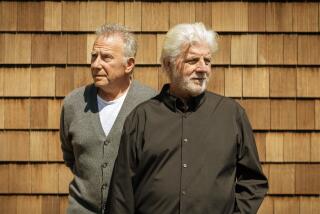Book review: ‘Familyhood’
I was so ready to dismiss this little book as the musings of a sitcom quipster with not much to add to the national discourse — when, during one of those insufferably long children’s birthday parties, another dad began to rant about many of the same things that Paul Reiser does in “Familyhood.”
Sure enough, Reiser digs deeper than expected for some very relatable observations in this follow-up to his bestselling books “Couplehood” and Babyhood.”
It seems to take a while for Reiser to hit his stride. Early on, I didn’t really trust his glibness or sit-com sensibilities. That’s because we still know him best from television, primarily “Mad About You” and the short-lived “Paul Reiser Show.” As a performer, Reiser’s particular gift seems to give words a percussive emphasis, almost a rim shot. They are reactive, these jabs, to the other people in the show.
In his writing, it takes a while to hear that voice again, to find the beats of his sentences. But if you like Reiser the comic, you’re likely to enjoy Reiser the writer. That personal connection is important, for he’s covering some pretty familiar ground in this collection of 22 essays: his struggles with technology, his two sons going off to camp, the frustration of GPS devices.
Point of view is everything with Reiser, not to mention an eye for the little things in a father’s life. Reiser doesn’t so much pick the right word as accentuate the right emotion.
“Next to the computer on my desk is a black-and-white photograph of my mother and father on their wedding day,” he writes. “They look impossibly young; he in his Army uniform, looking like a cross between John Garfield and Glenn Miller; she, beautiful and sparkling, a Jewish Donna Reed. Stare at it long enough and you can almost make out the sound of their thoughts.”
Fine passage, particularly that “sound of their thoughts” line. It captures Reiser at his best — reflecting on those around him in almost shamelessly loving ways. He is so nicely tuned in to this trait of his that he doesn’t hesitate to mock it a little. Recalling a conversation with one of his sons, he writes: “I once said ... ‘Hey, did I ever tell you I love you?’ His response? A slight rolling of the eyes and a perfectly annoyed, ‘Yes, you did. Too much, frankly.’”
An essay that will particularly hit home, especially in Los Angeles or New York, is Reiser’s riff on trying to get his 6th-grader into a decent private school: “What was most jolting — and what I was least prepared for — was realizing that we were, for the first time, presenting our child for the approval of others.”
Fatherhood fits Reiser: It plays right into his wheelhouse, which is modern American frustrations. He doesn’t hold back on how being a parent can change you in some positive, though completely uncool, ways. And perhaps the most interesting passages come when he puts his natural glibness aside and speaks from the heart about watching his children discover new things:”I’m saddened when they discover something about life that I wish weren’t so. It hurts me when I see them not trusting or believing someone — yet ironically, seeing them actually being trusting and believing breaks my heart too.”
But what I liked most, and an echo of the birthday party conversation between my buddy and me, is Reiser’s spinout over people coming into his home. For a man with such a public life — three books, two TV shows — he sure is protective of his domain. “A moat won’t cut it … what we need is something subtler,” he says, “a defense more nuanced in its give and take. We need a membrane. A semi-permeable membrane, like living cells have. And mitochondria.”
An example of today’s hovering parent (I’m one too), Reiser may have, inadvertently, given us a little glimpse of ourselves — how we know that we’re maybe too involved with our children’s lives but can’t really help ourselves.
In any case, good writing has a way of letting us feel a little less alone in the world. It validates some of our dreams and dissatisfactions, makes us nod along, knowing we have an ally.
Reiser has done that here, hitting fatherhood on the head with a sweet, personal little book brimming with wit and understanding.
More to Read
Sign up for our Book Club newsletter
Get the latest news, events and more from the Los Angeles Times Book Club, and help us get L.A. reading and talking.
You may occasionally receive promotional content from the Los Angeles Times.







